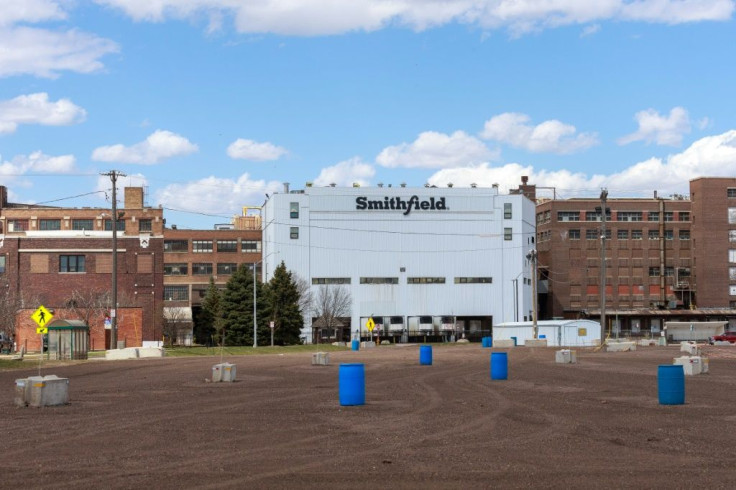Despite Virus Outbreaks, US Meat Plants Told To Stay Open
US slaughterhouses are being forced to stay open on government orders despite deadly coronavirus outbreaks among workers, as authorities move to ensure supermarkets are fully stocked with meat.
President Donald Trump signed the executive order on Tuesday under the Defense Production Act, a law designed for use in wartime to divert private business for defense and security needs.
Several major plants where farmers send cattle, pigs and poultry have shut due to the rapid spread of COVID-19 between employees, who are often in close proximity on production lines and on breaks.
At least 18 plants across the United States have been temporarily closed in the last two months, cutting pork processing capacity by as much as 20 percent and beef processing capacity by 10 percent, the Farm Bureau industry group said.
"In some cases, the closures were due to outbreaks among workers at the plants. In other cases it is a struggle to keep workers, who are afraid of getting sick, coming into the plant," it said.
The stoppages raise the risk of empty shelves in US stores, while -- on the production end -- breeders have nowhere to send their animals to slaughter.
Cows can continue to graze, but many pigs are fattened indoors on a tight schedule and, if they become too fat, they lose their value and can be injured.
The US Department of Agriculture (USDA) has set up a special unit to support farmers who need to process animals, including helping breeders to slaughter them themselves.
"The president's executive order will help avert hardship for agricultural producers and keep safe, affordable food on the tables of American families," said Julie Anna Potts, president of the Meat Institute, which represents meat packers and processors.

Slaughterhouse owners say they have introduced extra sanitation measures to protect workers, including screening tests, temperature checks, face gear and plexiglass shields.
But unions say that management did not take the situation seriously enough and the precautions came too late.
The shuttered Smithfield Foods plant in Sioux Falls, South Dakota, where some 3,700 people usually slaughter, butcher and process thousands of pigs every day, "is very old," Kooper Caraway, local leader of the AFL-CIO union, told AFP.
"The hallways are very narrow, the locker rooms are small, the lunch rooms are small," he said.
"Not only are workers working shoulder to shoulders on the assembly line, but they are... changing clothes and eating shoulder to shoulder.
"The plant instituted all the changes that workers requested but by then several dozens workers had already tested positive and the plant was already a hot spot."
The United Food and Commercial Workers union says 20 meat industry employees have died and at least 6,500 have been affected.
"For the sake of all our families, we must prioritize the safety and security of these workers," said union president Marc Perrone, calling for authorities to closely monitor prevention measures taken by companies.
Food and Water Watch, a non-profit group that campaigns for greater accountability in the food chain, denounced giant meat companies for claiming there was a risk of shortages despite high levels of frozen beef and chicken.
"It's crucial the food industry protects workers by closing plants when necessary in order to keep the food system from collapsing entirely," its government affairs representative Tony Corbo said.
"The federal government should be stepping in ... to get our abundant frozen meat supplies to stores and food banks that need them."
© Copyright AFP 2024. All rights reserved.





















